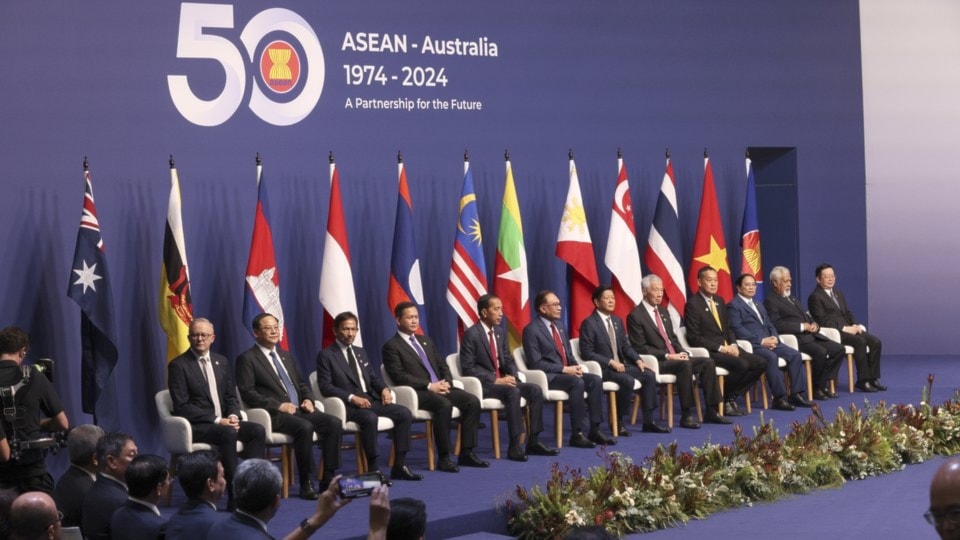Australia, ASEAN call for 'immediate, durable' ceasefire in Gaza
Australia has organized a summit in Melbourne with the Association of Southeast Asian Nations (ASEAN) to commemorate the 50th anniversary of their partnership.
-

Members of ASEAN pose for a photo during the Association of Southeast Asian Nations, ASEAN-Australia Special Summit in Melbourne, Australia, Tuesday, March 5, 2024. (AP)
Australia and Southeast Asian nations concluded a three-day summit on Wednesday, jointly advocating for moderation in the disputed South China Sea and a durable ceasefire in the Gaza Strip.
Australia organized a summit in Melbourne with the Association of Southeast Asian Nations (ASEAN) to commemorate the 50th anniversary of their partnership. Despite existing variations among the 10 member nations regarding what the US claims are Chinese intentions to expand its diplomatic and military influence in the region, the summit took place.
The collective statement by Australia and ASEAN restated concerns about the grave humanitarian situation in Gaza, while also urging for an immediate ceasefire.
"We condemn attacks against all civilians and civilian infrastructure, leading to further deterioration of the humanitarian crisis in Gaza including restricted access to food, water, and other basic needs," the statement said.
"We urge for an immediate and durable humanitarian ceasefire," it added.
In a different context, the joint statement also urged a "rules-based" order in the Indo-Pacific, as Beijing eyes boosting its presence in its own front yard, the South China Sea, amid increasing US provocations.
"We recognize the benefits of having the South China Sea as a sea of peace, stability, and prosperity," the statement stressed.
"We encourage all countries to avoid any unilateral actions that endanger peace, security, and stability in the region," it added.
The announcement coincided with the Philippines summoning China's deputy chief of mission in Manila on Tuesday. The purpose was to lodge a protest against what the Philippines claimed were "aggressive actions" by Chinese naval forces during a resupply mission for Filipino troops stationed on a shoal in the South China Sea.
'China-phobia' in the West
During a joint press conference with Albanese on Monday, Malaysian Prime Minister Anwar Ibrahim expressed concerns about a rising "China-phobia" in Western countries. In an interview published in The Sydney Morning Herald on Tuesday, Anwar asserted that the perceived threat of conflict in the South China Sea had been overstated.
It is worth noting that ASEAN comprises countries with Muslim-majority populations, such as Malaysia, Indonesia, and Brunei. In contrast, Australia has consistently supported "Israel", although it has previously advocated for a ceasefire and expressed concern about the unbearable civilian toll.
Read next: In 151 days only: 30,631 killed, 72,043 injured in Gaza

 3 Min Read
3 Min Read








